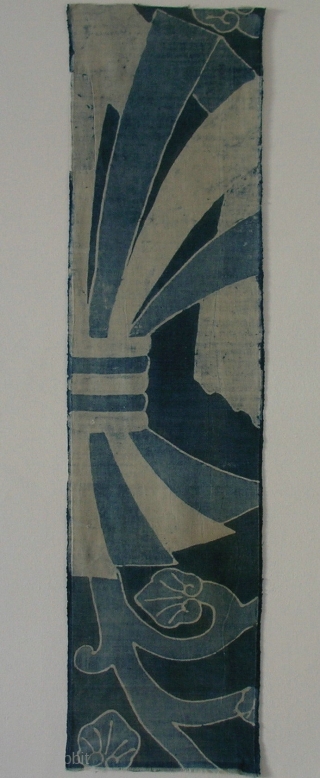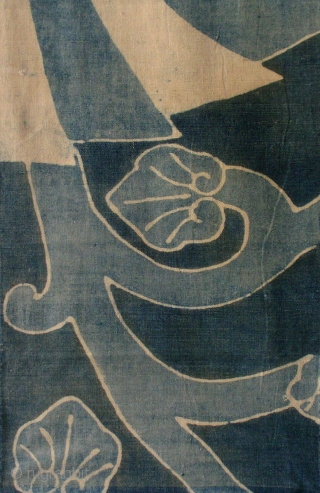Back
Tsutsugaki ‘noshi’ futonji panel, Japan, Meiji (circa 1880), cm 131x33. This is a really lovely panel from a bedding cloth (futonji), decorated in the so-called ‘tsutsugaki’ technique with the pattern of a ‘noshi’ in different tones of indigo and white. Noshi are a kind of ceremonial origami (consisting of white paper folded with a strip of abalone, considered a token of good fortune) that are attached to gifts to express “good wishes”. The cotton is hand spun and hand woven, the design rendering is beautifully clear and the different shades of indigo colour have very nicely faded over time. The cloth has just the right amount of wear; it still embodies the soulful, old Japanese feeling without being worn-out or sad from too much age. All in all, an intriguing length of indigo dyed cotton where the single patch at one side (see pictures of front and reverse) adds a striking touch to this otherwise very fine piece. Great graphic seen thru the lens of age. Much recommended.
price:
SOLD
- Home
- Antique Rugs by Region
- Category
- Profiles
- Post Items Free
- Albums
- Benaki Museum of Islamic Art
- Budapest: Ottoman Carpets
- Gulbenkian Museum
- Islamic Carpets. Brooklyn
- Islamic Textiles. Brooklyn
- Konya Museum: Rugs
- MKG, Hamburg
- MMA: Caucasian Carpets
- MMA: Mamluk Carpets
- MMA: Mughal Indian Carpets
- MMA: Ottoman Carpets
- MMA: Safavid Persian Carpets
- MMA: Turkmen Rugs
- McCoy Jones Kilims
- Ottoman textiles. Met
- Philadelphia Museum
- Rugs and Carpets: Berlin
- Seljuqs at the Met
- TIEM, Istanbul: Carpets
- V&A: Classical Carpets
- Vakiflar Carpets: Istanbul
- Baluch Rugs: Indianapolis
- Gallery Exhibitions
- Jaf an Exhibition
- Alberto Levi Gallery
- Andean Textile
- Christie's London: 2016
- Francesca Galloway
- HALI at 40
- ICOC Washington, DC 2018
- Jajims of the Shahsavan
- London Islamic Week April, 2018
- Mongolian Felts
- Navajo Rugs: JB Moore
- Persian Piled Weavings
- SF Tribal & Textile Art Show 2020
- SF Tribal 2019
- Sotheby's: C. Alexander
- Turkish Prayer Rugs
- Turkmen Main Carpets ICOC 2007









